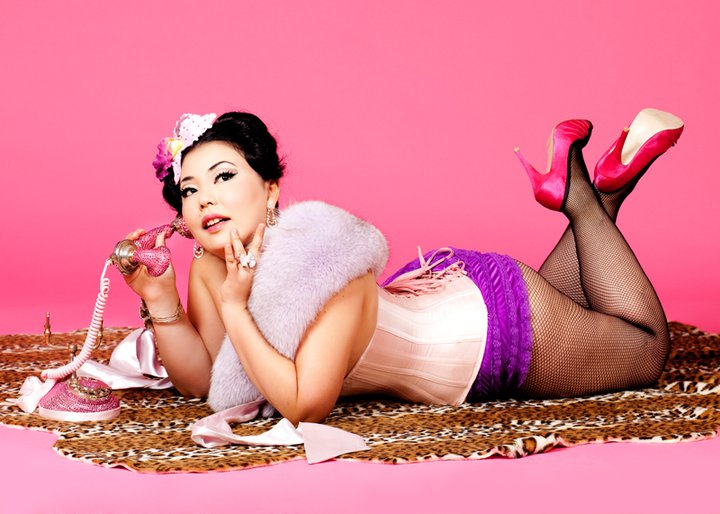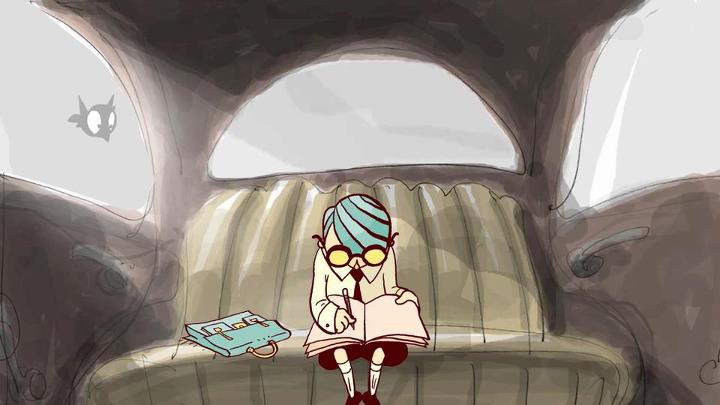
I was shocked when I heard that Montreal burlesque personality Cherry Typhoon is heading back to her home country of Japan. She’s been a light on the stage in the city for at least five years with cross-country and international appearances.
As it turns out, she’s not going to be gone entirely. Whew. Cherry has always returned to Tokyo for several months each year while living here. She’ll be reversing the trend, spending a few months each year in Montreal. For those who can’t wait for her big smile and passion for performing, take heart; she already has something booked for July.
I sat down with Cherry to talk about her burlesque biography — how she got started and how she sees the future of the art form.

Cherry trained in Tokyo as a theatre professional. In 2003, she formed a group called the Murasaki Baby Dolls. This “burlesque” troupe defied many culture norms for actresses in Japan, if only because the actresses were over the age of 23. “In Japanese commercial theatre, after 23 years old, the actresses don’t get many bookings,” she explains. Even her theatre mentor warned Cherry not to work with friends of her own age because she would be unable to book them in her shows. “I thought, ‘Tabernack!'” Cherry says, though she lets me know that equivalent Japanese expression is “Chi-ki-sho.”
Nonetheless, Cherry ignored the advice. Not only did she find bookings, but the group won awards. She was involved in multiple projects. In 2005, she joined “That’s Cabaret in NY,” and then, Miss Indigo Blue encouraged her to join “Tease-O-Rama 2005.” After that, she participated in Miss Exotic World in 2006 and won World Best troupe. The experience was important for Cherry. “I saw the top stars of the burlesque scene and it was amazing. They were using their body to express their own personality. They use their body and personality to express their voice. It was opposite the commercial theatre scene in Japan, so I decided to start my solo work.”
Doing burlesque in Japan is no minor thing. Cherry tells me that today, there are only 15 professional burlesque performers in Japan, and around 50 amateurs. “It is very scandalous to do burlesque,” she says. When she started, she kept her burlesque secret, but one day she decided that it wasn’t fair. “This is my life. If family has no idea about my life, it is not fair,” she says. “I will invite them to my best stage. My mommy comes to the show. She enjoyed the show, but she said afterwards, ‘I wish that burlesque dancer is not my daughter. I enjoyed, but I really wished…’ Okay, she’s honest. Many Japanese burlesque dancers still hide that they do that. It’s considered a shame in Japanese society, but it is not a shame! Never!” She laughs and tells me that many international burlesque dancers now stay with her parents when they come to Japan. “Little by little, they tell her and she is understanding,” says Cherry.
Cherry was first introduced to Montreal when her friend Yanomi, a clown, asked her to perform at the Montreal Fringe Festival. She came back in 2009 and won the Rosita Royse Award in Montreal’s first burlesque festival. “It was such an honour,” she says. “I thought what if I can live in Montreal? That would be a dream! But of course, I erase it. It’s only a dream. I grew up in Tokyo. It was not reality.” She explains that she comes from a traditional, conservative family with a “serious background.” “My family never dreamed of their daughter going overseas to North America and doing burlesque.”
But, those who dare to dream are sometimes rewarded, especially when they take action. In 2011, she decided to go for it. She is lyrical on her move. “I can say the stage brought me to Montreal. Everyone has their town. They’re born in some town, live in some town. The interesting thing is that sometimes the town is not your hometown,” she says. “In my case, my hometown is downtown Tokyo, but my town – or the town of my destiny – was Montreal.”
The appeal was something everyone in the Montreal performance community can take pride in: a willingness to let disciplines cross and mix. “I find it very unique, the Montreal theatre scene. In Tokyo, theatre, music, circus are all divided. In Montreal, there is diversity, a diversity of people, everyone has a background. There is English/French diversity. I find in Montreal that everything is put into the pot of the theatre scene. It’s very original.”
Of course getting started as an independent performer in a new city is not easy. Her biggest support came from the Fringe Festival and the other burlesque performers in Montreal. Cherry says, “Thanks to the Fringe community. Thanks to Mlle Oui Oui Encore, Miss Sugarpuss, Miss Seska Lee, L. Diablo. They all supported me.”

While living here, Cherry has performed at festivals, congresses, and events all around the world, from Vancouver to Helsinki to New York. Cherry has seen the scene explode as well, though she notes that this has its positive and negative sides. For Montreal, the increased popularity has been a good thing because the scene here stays unique and focuses on originality. She names the venues and stages that host burlesque regularly and specifically points to Burlesgeek as an example of the city’s openness. “Burlesgeek at Sala Rosa. That is so special, so much fun. It combines sexy and ridiculousness.”
She warns thought that the popularity of the art form has the effect of flattening it out. “Many girls want to start burlesque for fame,” she says. “It’s natural, but the quality of the entertainment is flattened out and there’s more of the same. The costumes look uniform. What I love about burlesque is the uniqueness of every performer. I wish for more and more uniqueness to happen.”
To this end, Cherry has a mission. Jo Boobs, head of the NY Burlesque school, told Cherry that they were already part of the history of burlesque and how had to help keep the tradition going. “That was a huge comment,” Cherry says. “Oh my god, we were!… So why don’t we…”

“Performing is the best part,” Cherry further explains. “In burlesque, the original people gave us their history and their love. Thanks to these pioneers, we perform. The best part for me is performing, but I would like to give something to the next generation too.”
Cherry started teaching in Montreal and one day realized that she could be a pioneer for the art in another way: by teaching in her home country as well. She turned her annual two-month pilgrimage to Japan into an opportunity to teach and educate the Japanese about the burlesque art form. “In 2013, I started teaching Lab Burlesque, a burlesque education program, to three different cities.” Furthermore, she had burlesque films translated into Japanese.
This time, Cherry hits the ground running when she returns to Japan with a show just two days after her plane touches down. In May, she is organizing a burlesque expo in Japan. “I will bring back the first queen of burlesque, Erochica Bamboo” Cherry says.
Most importantly, Cherry loves those who have supported her, both directly and indirectly. “I really want to tell the burlesquers and audiences in Montreal — I really want to tell people, all of them in Montreal — thank you so much for your love.”
Then she says, “And I will be back.”
Cherry Typhoon’s goodbye show I Love Cherry Typhoon takes place at the Wiggle Room on Feburary 28 at 9 p.m. $20/25.





She is absolutely gorgeous! I’d love to see her routine, she seems to have an amazingly firey personality!…